外研版(2019)必修 第二册Unit 2 Let's celebrate! Using language Modals课件(共37张PPT 内嵌视频)
文档属性
| 名称 | 外研版(2019)必修 第二册Unit 2 Let's celebrate! Using language Modals课件(共37张PPT 内嵌视频) |
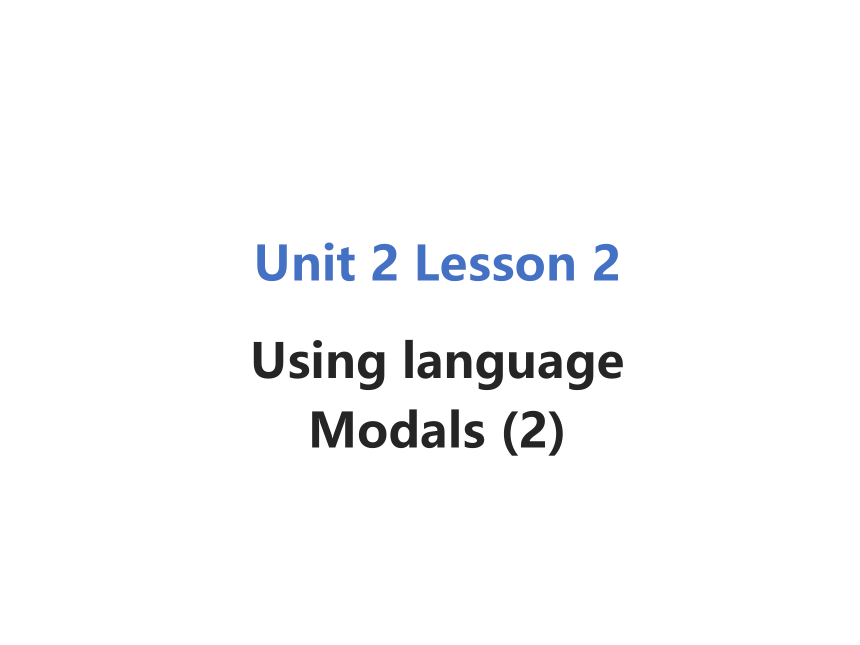
|
|
| 格式 | pptx | ||
| 文件大小 | 51.5MB | ||
| 资源类型 | 教案 | ||
| 版本资源 | 外研版(2019) | ||
| 科目 | 英语 | ||
| 更新时间 | 2023-10-25 19:46:53 | ||
图片预览

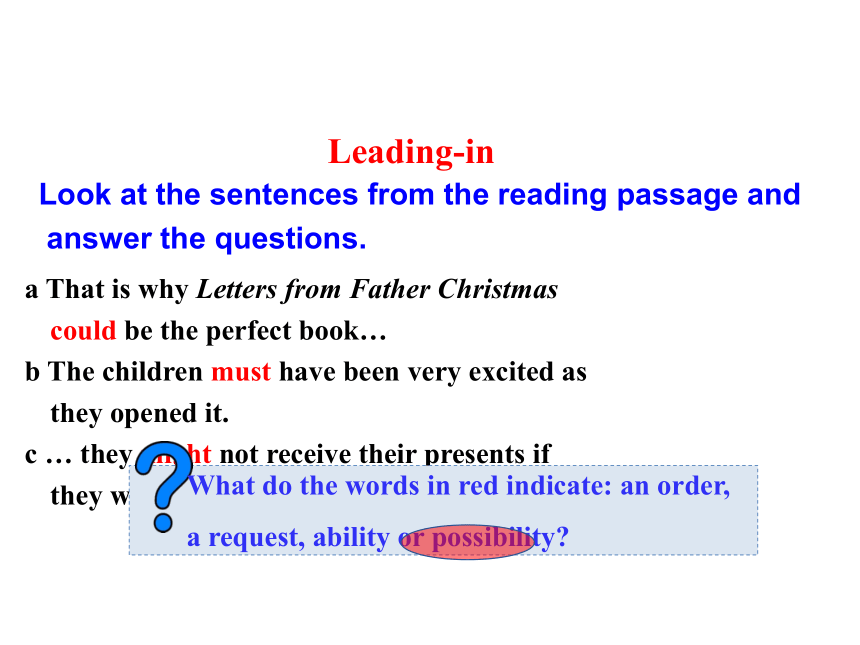
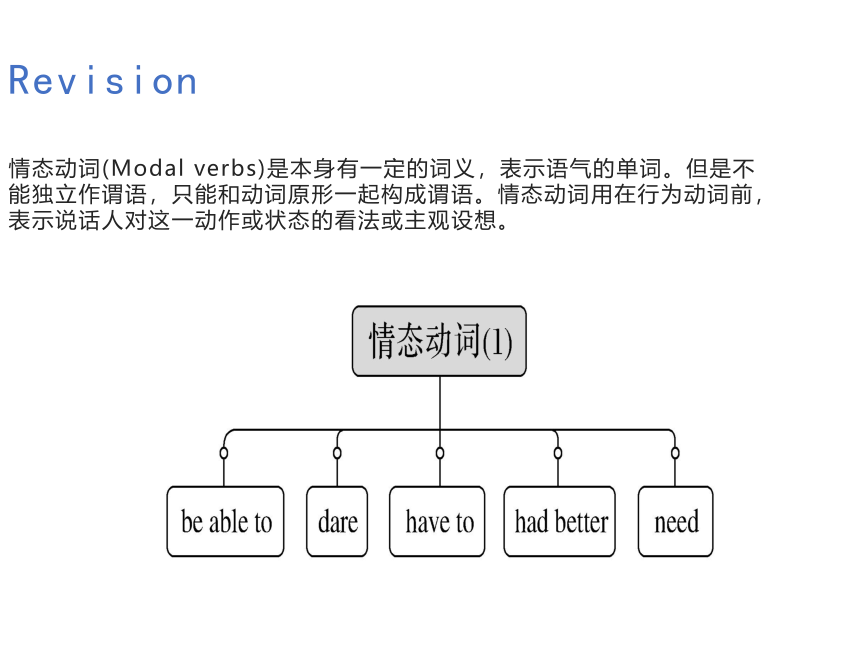

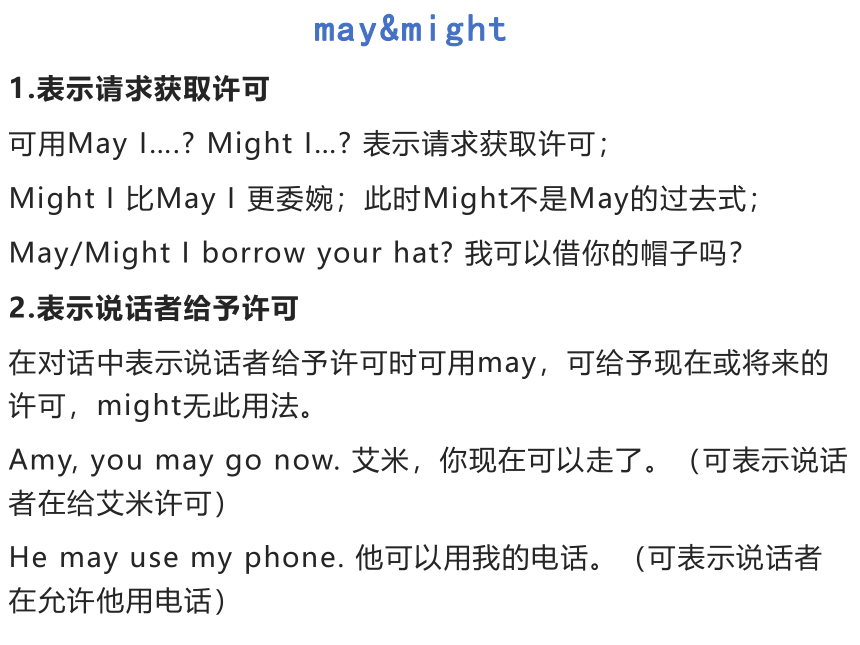
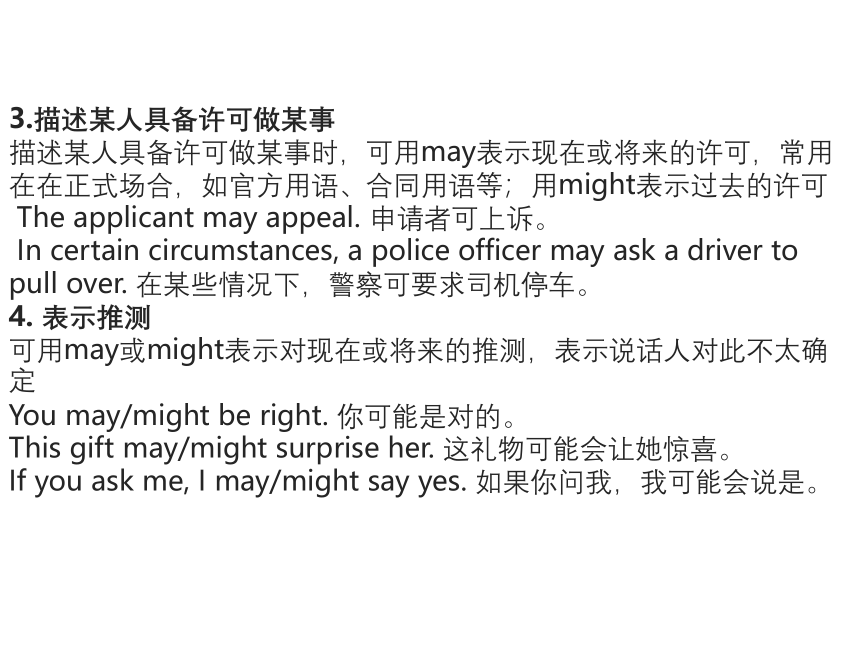
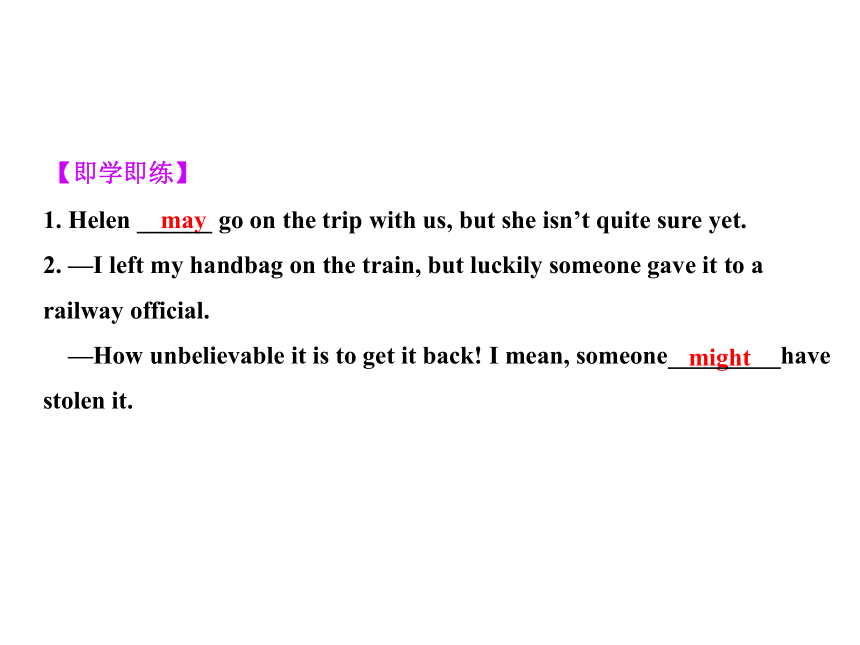
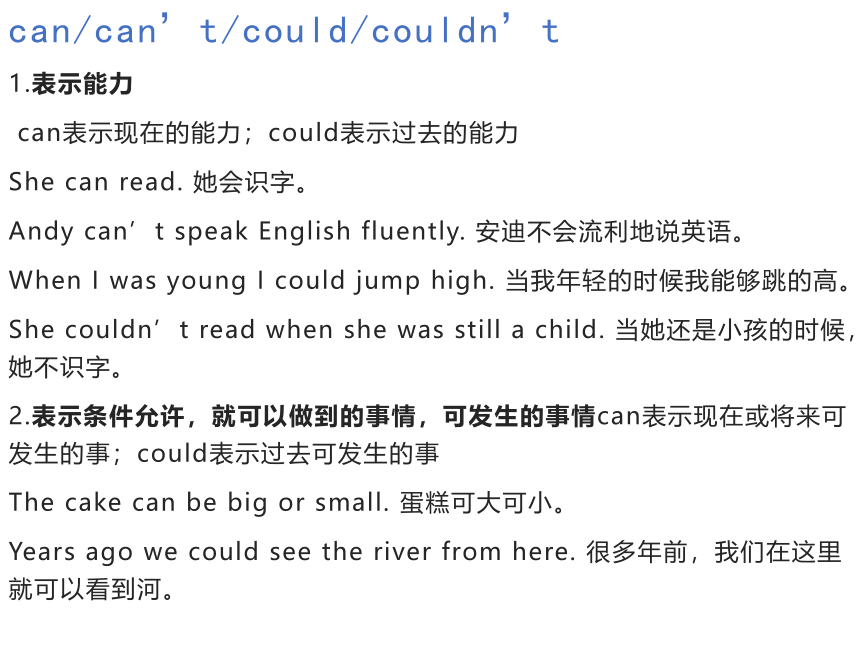

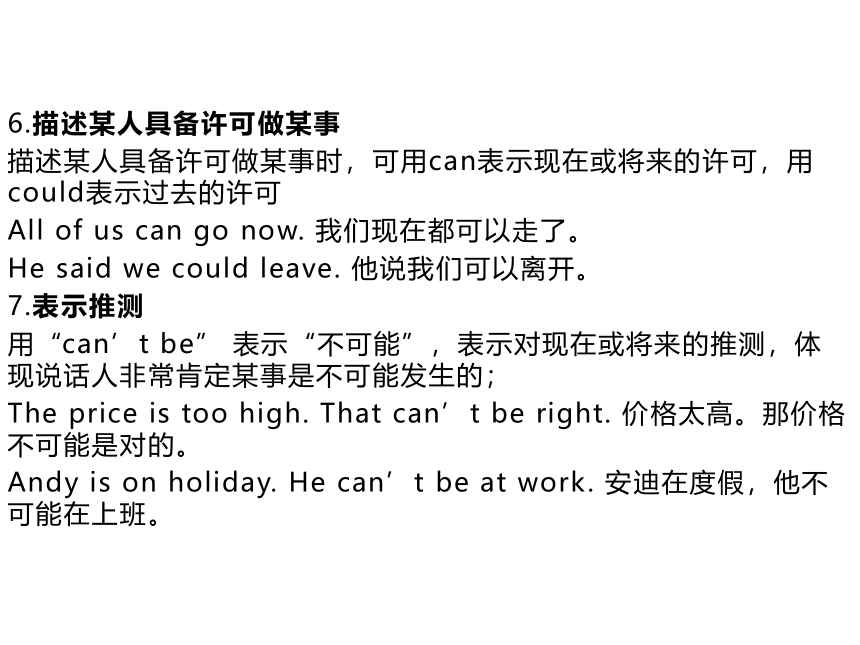
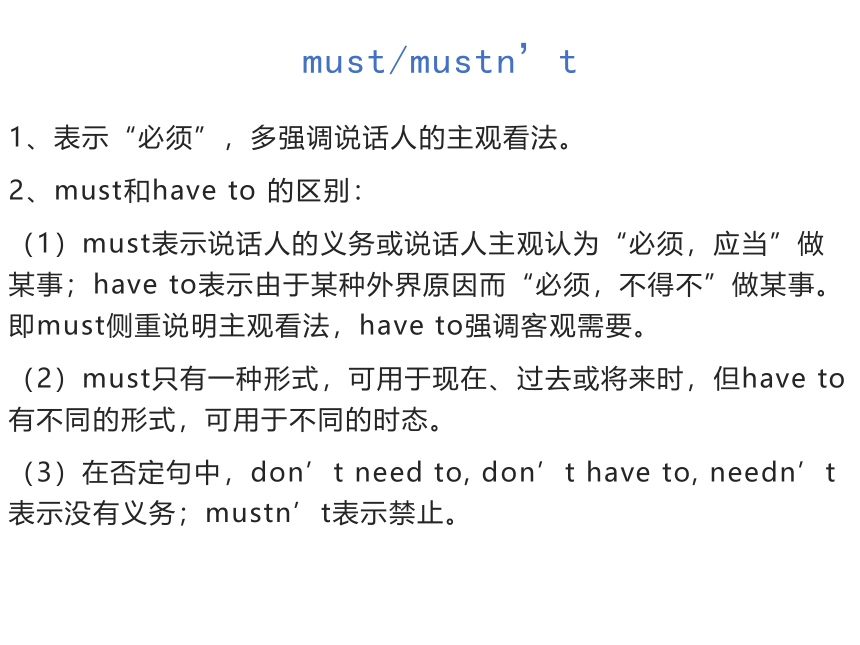
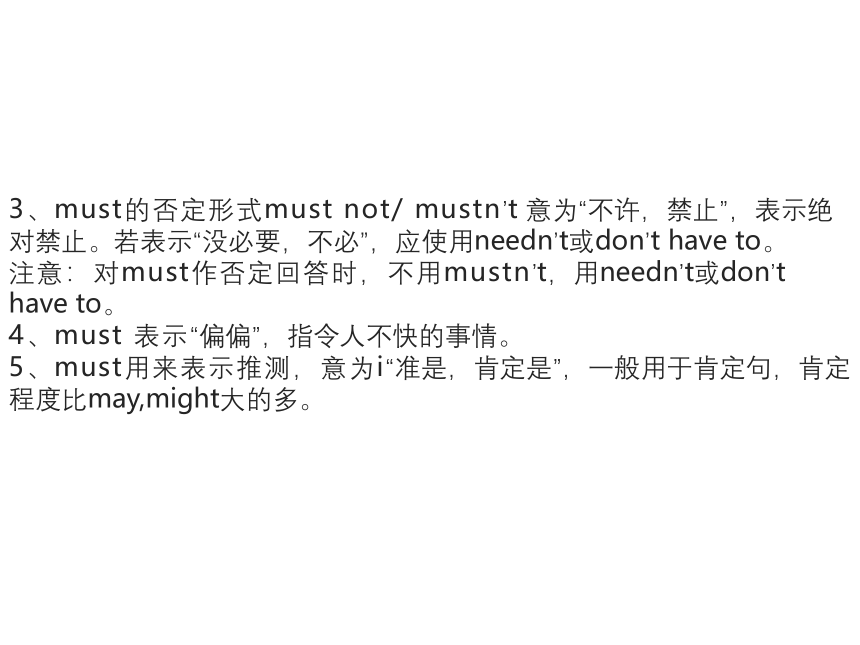
文档简介
(共37张PPT)
Unit 2 Lesson 2
Using language
Modals (2)
Look at the sentences from the reading passage and answer the questions.
a That is why Letters from Father Christmas could be the perfect book…
b The children must have been very excited as they opened it.
c … they might not receive their presents if they were not good.
Leading-in
What do the words in red indicate: an order, a request, ability or possibility
Revision
情态动词(Modal verbs)是本身有一定的词义,表示语气的单词。但是不能独立作谓语,只能和动词原形一起构成谓语。情态动词用在行为动词前,表示说话人对这一动作或状态的看法或主观设想。
Presentation
may&might
1.表示请求获取许可
可用May I…. Might I… 表示请求获取许可;
Might I 比May I 更委婉;此时Might不是May的过去式;
May/Might I borrow your hat 我可以借你的帽子吗?
2.表示说话者给予许可
在对话中表示说话者给予许可时可用may,可给予现在或将来的许可,might无此用法。
Amy, you may go now. 艾米,你现在可以走了。(可表示说话者在给艾米许可)
He may use my phone. 他可以用我的电话。(可表示说话者在允许他用电话)
3.描述某人具备许可做某事
描述某人具备许可做某事时,可用may表示现在或将来的许可,常用在在正式场合,如官方用语、合同用语等;用might表示过去的许可
The applicant may appeal. 申请者可上诉。
In certain circumstances, a police officer may ask a driver to pull over. 在某些情况下,警察可要求司机停车。
4. 表示推测
可用may或might表示对现在或将来的推测,表示说话人对此不太确定
You may/might be right. 你可能是对的。
This gift may/might surprise her. 这礼物可能会让她惊喜。
If you ask me, I may/might say yes. 如果你问我,我可能会说是。
【即学即练】
might
may
1. Helen ______ go on the trip with us, but she isn’t quite sure yet.
2. —I left my handbag on the train, but luckily someone gave it to a
railway official.
—How unbelievable it is to get it back! I mean, someone_________have
stolen it.
can/can’t/could/couldn’t
1.表示能力
can表示现在的能力;could表示过去的能力
She can read. 她会识字。
Andy can’t speak English fluently. 安迪不会流利地说英语。
When I was young I could jump high. 当我年轻的时候我能够跳的高。
She couldn’t read when she was still a child. 当她还是小孩的时候,她不识字。
2.表示条件允许,就可以做到的事情,可发生的事情can表示现在或将来可发生的事;could表示过去可发生的事
The cake can be big or small. 蛋糕可大可小。
Years ago we could see the river from here. 很多年前,我们在这里就可以看到河。
3.表示请求他人做某事可用 Can you… Could you… 表示请求他人做某事。Could you 比Can you 委婉,此时could不是can的过去式
Could/Can you give me the book 请把书给我,好吗?
Could/Can you open the window please 请开窗,好吗?
4.表示请求获取许可
可用 Can I… Could I… 表示请求获取许可。Could I 比Can I 更常用;此时could不是can的过去式
Could/Can I have a word with you 我可以和你说几句话吗?
Could/Can I use your phone 我可以用你的电话吗?
5.表示说话者给予许可
在对话中表示说话者给予许可时可用can,可给予现在或将来的许可,could无此用法。
Amy, you can go now. 艾米,你现在可以走了。(可表示说话者在给艾米许可)
He can use my phone. 他可以用我的电话。(可表示说话者在允许他用电话)
6.描述某人具备许可做某事
描述某人具备许可做某事时,可用can表示现在或将来的许可,用could表示过去的许可
All of us can go now. 我们现在都可以走了。
He said we could leave. 他说我们可以离开。
7.表示推测
用“can’t be” 表示“不可能”,表示对现在或将来的推测,体现说话人非常肯定某事是不可能发生的;
The price is too high. That can’t be right. 价格太高。那价格不可能是对的。
Andy is on holiday. He can’t be at work. 安迪在度假,他不可能在上班。
must/mustn’t
1、表示“必须”,多强调说话人的主观看法。
2、must和have to 的区别:
(1)must表示说话人的义务或说话人主观认为“必须,应当”做某事;have to表示由于某种外界原因而“必须,不得不”做某事。即must侧重说明主观看法,have to强调客观需要。
(2)must只有一种形式,可用于现在、过去或将来时,但have to有不同的形式,可用于不同的时态。
(3)在否定句中,don’t need to, don’t have to, needn’t表示没有义务;mustn’t表示禁止。
3、must的否定形式must not/ mustn’t 意为“不许,禁止”,表示绝对禁止。若表示“没必要,不必”,应使用needn’t或don’t have to。
注意:对must作否定回答时,不用mustn’t,用needn’t或don’t have to。
4、must 表示“偏偏”,指令人不快的事情。
5、must用来表示推测,意为i“准是,肯定是”,一般用于肯定句,肯定程度比may,might大的多。
Watch the video
情态动词+动词原形
1)can+动词原形
A.用于肯定句,表示客观可能性,意为“可能”,即从理论上看是可能的,但不一定会发生。例如:
As a human being, anyone can make a mistake.
作为人类,任何人都有可能犯错。
B.用于否定句或疑问句,表示对现在的动作或状态进行主观的猜测,意为“可能”,或表示惊异、怀疑等态度。例如:
a. He can't have a lot of money. 他不可能有很多钱。
b Can it be that it was l, not he, who was mistaken
难道是我弄错了,而不是他弄错了
情态动词表推测的用法
情态动词+动词原形
2)may+动词原形,表示主观的推测,意为“或许”,用于肯定句和否定句均可。例如:
a. He may be very busy now. 他现在可能很忙。
b. He may not be at home. 他可能不在家。
注意:表示可能性时,can't语气较强,表示“不可能”; may not语气较弱;表示“可能不,或许不”。
3) might+动词原形,表示推测,意为“可能",可以指过去的情况,也可以指现在的情况,但语气比may更加不肯定。用于肯定句或否定句均可。例如:
a. They might have a lot of work to do now but I'm not sure.
他们现在可能有很多活儿要干,不过我不确定。
b. She was afraid they might not like the idea. 她担心他们可能不喜欢这个想法。
情态动词表推测的用法
情态动词+动词原形
4)could+动词原形,意为“可能”,可以指过去的情况,也可以指现在的情况,语气缓和。多用于否定句或疑问句。例如:
a. He looks young. He couldn't be over 50. 他看起来很年轻,不可能超过50岁。 b. Could it be true 那可能是真的吗
5)must+动词原形,表示猜测,意为“准是,一定”,通常用于肯定句。例如:
a. This must be your room. 这一定是你的房间。
b Look at his new car. He must have a lot of money. 瞧他那辆新车。他肯定很有钱。
情态动词表推测的用法
情态动词+完成式
1)must+完成式,表示对已发生情况的推测,通常用于肯定句。例如:
She must have gone home. 她肯定已经回家了。
2)can+完成式,表示对已发生情况的推测,主要用于否定句或疑问句。
例如:
a. You can't have forgotten her. 你不可能已经忘记她了。
b. Where can she have put it 她到底把它放在哪儿了呢
情态动词表推测的用法
情态动词+完成式
3) could+完成式,表示对过去情况的推测,多用于否定句或疑问句。
例如:
a. He could not have been more than 16 at that time. 他当时不可能超过16岁。
b Could she have forgotten my address 她会忘记我的地址吗
4)may/ might+完成式,表示对已发生事情的不肯定的推测,mght相比may语气更加不肯定。
例如:
He may / might have come by train. 他可能是坐火车来的。
情态动词表推测的用法
四、情态动词+have done
“can/could/may/might/must + have done”表示对过去事情的推测。各情态动词的表示推测的用法如下表:
形式 用法
must have done 过去肯定做过
can’t/ couldn’t have done 肯定没做过(否定句)
can/could+主语+have done 可能做过吗(疑问句)
may/might have done 或许/可能做过某事
From what you said, she must have told you all about it.
从你所说的来看, 她一定把一切都告诉你了。(只能用在肯定句中)
e.g. He can’t have finished the task in such a short time.
他不能在如此短的时间内完成这项任务。(只能用在否定句)
e.g. Can he have told you the secret yesterday
昨天他可能告诉过你那个秘密吗 (用在疑问句)
用适当的情态动词填空。
(1) He _____________ have forgotten it. I told him just now.
(2) It’s too late; I think he __________have gone to bed.
(3) Mary went home. She _____ have finished her work.
can’t/couldn’t
may/ might
must
情态动词+ have done”表示虚拟语气的用法:
could have done表示本来能够做某事但没做 (用于肯定句中)
should/ought to have done 表示本应该做某事但没做, 其否定式 表示本不该做但却做了
might have done表示本可以做某事但没做
needn’t have done表示本没有必要做某事但做了
e.g. You shouldn’t have told her the truth.
你本不该告诉她真相。
e.g. I could have given him some help, but I was busy then.
我本能够给他一些帮助, 但是当时太忙了。
e.g. You needn’t have come, it is Sunday.
你本没必要来, 今天是星期天。
Ⅰ. 用适当的情态动词填空
1. Where _________you have gone to I ________ find you just now.
2. You ____ take whatever you like.
3. You __________ as well stay where you are and it is easy for me to see you.
4. —_____ I hand in my homework tonight
—No, you _______. You ____ hand it in tomorrow.
5. He speaks English fluently. He _____ have learned English before.
6. May I come in Yes, you ____.
can/ could
couldn’t
may
may/might
Must
needn’t
can
must
may
7. You _____ be too careful to cross the road.
8. Generally speaking, it is warm in spring but it ____ be very cold in some bad
weather.
9. ____our friendship last long.
10. Why _____ you smoke in the meeting room
can’t
can
May
must
Ⅱ. 完成句子
1. It is cloudy and cold. It _________later this afternoon.
天气阴冷, 今天下午可能会下雪。
2. Don’t scold him for his mistake again. Anybody _________________.
不要因为他的错误再批评他了, 任何人都可能犯错误。
3. You ____________________here or you will be fined.
你禁止把车停在这里, 否则你会被罚款的。
4. The old man is so tired that he _______any farther.
这位老人非常累, 以至于再也不能走得更远了。
may snow
can make mistakes
mustn’t park your car
can’t go
5. —May I use your ruler —Sorry, you _____.
——我可以用用你的尺子吗 ——抱歉, 你不能。
6. —________________how to get to the hospital
——你能告诉我怎么到达医院吗
—Of course, I ____.
——当然能。
7. ________________every day!
愿你天天快乐!
can’t
Could you tell me
can
May you be happy
8. When you are tired, you __________________and have a rest.
当你累了, 不妨坐下来休息一下。
9. He is very friendly to everyone but sometimes he ___________________.
他对每个人非常友好, 但是有时他很固执。
10. He is a good student but he ___________play computer games.
他是个好学生,但是他偏偏喜欢玩电脑游戏。
may as well sit down
can be very stubborn
must like to
You must be tired now!
It may/might/could be him.
be Lucy.
That must
may / might / could be from our school.
They
that can’t be Lucy.
Watch the video
Possible versions:
The woman in red must be very excited to buy so many things.
The man with a wallet in his hand might be a bit reluctant to pay.
The woman with glasses may be very tired to get up so early and carry so many bags.
The cashier might be feeling uncomfortable as he is sweating a lot.
a scarf
a red envelope
rice balls
balloons
posters
hold a lantern fair
let off fireworks
hold a lantern riddles
competition
a dress
chocolates
dumplings
noodles
banners
flowers
parade
have a reunion dinner
Assignment:
Introduce the Lantern Festival to Mr. and Mrs. White, who are interested in traditional Chinese culture, and invite them to join you to celebrate it.
3.Look at the picture and make as many sentences as possible using can/could, may/might and must.
Black Friday is one
of the busiest shopping
days of the year.Stores
have big sales and open
their doors very early.
Unit 2 Lesson 2
Using language
Modals (2)
Look at the sentences from the reading passage and answer the questions.
a That is why Letters from Father Christmas could be the perfect book…
b The children must have been very excited as they opened it.
c … they might not receive their presents if they were not good.
Leading-in
What do the words in red indicate: an order, a request, ability or possibility
Revision
情态动词(Modal verbs)是本身有一定的词义,表示语气的单词。但是不能独立作谓语,只能和动词原形一起构成谓语。情态动词用在行为动词前,表示说话人对这一动作或状态的看法或主观设想。
Presentation
may&might
1.表示请求获取许可
可用May I…. Might I… 表示请求获取许可;
Might I 比May I 更委婉;此时Might不是May的过去式;
May/Might I borrow your hat 我可以借你的帽子吗?
2.表示说话者给予许可
在对话中表示说话者给予许可时可用may,可给予现在或将来的许可,might无此用法。
Amy, you may go now. 艾米,你现在可以走了。(可表示说话者在给艾米许可)
He may use my phone. 他可以用我的电话。(可表示说话者在允许他用电话)
3.描述某人具备许可做某事
描述某人具备许可做某事时,可用may表示现在或将来的许可,常用在在正式场合,如官方用语、合同用语等;用might表示过去的许可
The applicant may appeal. 申请者可上诉。
In certain circumstances, a police officer may ask a driver to pull over. 在某些情况下,警察可要求司机停车。
4. 表示推测
可用may或might表示对现在或将来的推测,表示说话人对此不太确定
You may/might be right. 你可能是对的。
This gift may/might surprise her. 这礼物可能会让她惊喜。
If you ask me, I may/might say yes. 如果你问我,我可能会说是。
【即学即练】
might
may
1. Helen ______ go on the trip with us, but she isn’t quite sure yet.
2. —I left my handbag on the train, but luckily someone gave it to a
railway official.
—How unbelievable it is to get it back! I mean, someone_________have
stolen it.
can/can’t/could/couldn’t
1.表示能力
can表示现在的能力;could表示过去的能力
She can read. 她会识字。
Andy can’t speak English fluently. 安迪不会流利地说英语。
When I was young I could jump high. 当我年轻的时候我能够跳的高。
She couldn’t read when she was still a child. 当她还是小孩的时候,她不识字。
2.表示条件允许,就可以做到的事情,可发生的事情can表示现在或将来可发生的事;could表示过去可发生的事
The cake can be big or small. 蛋糕可大可小。
Years ago we could see the river from here. 很多年前,我们在这里就可以看到河。
3.表示请求他人做某事可用 Can you… Could you… 表示请求他人做某事。Could you 比Can you 委婉,此时could不是can的过去式
Could/Can you give me the book 请把书给我,好吗?
Could/Can you open the window please 请开窗,好吗?
4.表示请求获取许可
可用 Can I… Could I… 表示请求获取许可。Could I 比Can I 更常用;此时could不是can的过去式
Could/Can I have a word with you 我可以和你说几句话吗?
Could/Can I use your phone 我可以用你的电话吗?
5.表示说话者给予许可
在对话中表示说话者给予许可时可用can,可给予现在或将来的许可,could无此用法。
Amy, you can go now. 艾米,你现在可以走了。(可表示说话者在给艾米许可)
He can use my phone. 他可以用我的电话。(可表示说话者在允许他用电话)
6.描述某人具备许可做某事
描述某人具备许可做某事时,可用can表示现在或将来的许可,用could表示过去的许可
All of us can go now. 我们现在都可以走了。
He said we could leave. 他说我们可以离开。
7.表示推测
用“can’t be” 表示“不可能”,表示对现在或将来的推测,体现说话人非常肯定某事是不可能发生的;
The price is too high. That can’t be right. 价格太高。那价格不可能是对的。
Andy is on holiday. He can’t be at work. 安迪在度假,他不可能在上班。
must/mustn’t
1、表示“必须”,多强调说话人的主观看法。
2、must和have to 的区别:
(1)must表示说话人的义务或说话人主观认为“必须,应当”做某事;have to表示由于某种外界原因而“必须,不得不”做某事。即must侧重说明主观看法,have to强调客观需要。
(2)must只有一种形式,可用于现在、过去或将来时,但have to有不同的形式,可用于不同的时态。
(3)在否定句中,don’t need to, don’t have to, needn’t表示没有义务;mustn’t表示禁止。
3、must的否定形式must not/ mustn’t 意为“不许,禁止”,表示绝对禁止。若表示“没必要,不必”,应使用needn’t或don’t have to。
注意:对must作否定回答时,不用mustn’t,用needn’t或don’t have to。
4、must 表示“偏偏”,指令人不快的事情。
5、must用来表示推测,意为i“准是,肯定是”,一般用于肯定句,肯定程度比may,might大的多。
Watch the video
情态动词+动词原形
1)can+动词原形
A.用于肯定句,表示客观可能性,意为“可能”,即从理论上看是可能的,但不一定会发生。例如:
As a human being, anyone can make a mistake.
作为人类,任何人都有可能犯错。
B.用于否定句或疑问句,表示对现在的动作或状态进行主观的猜测,意为“可能”,或表示惊异、怀疑等态度。例如:
a. He can't have a lot of money. 他不可能有很多钱。
b Can it be that it was l, not he, who was mistaken
难道是我弄错了,而不是他弄错了
情态动词表推测的用法
情态动词+动词原形
2)may+动词原形,表示主观的推测,意为“或许”,用于肯定句和否定句均可。例如:
a. He may be very busy now. 他现在可能很忙。
b. He may not be at home. 他可能不在家。
注意:表示可能性时,can't语气较强,表示“不可能”; may not语气较弱;表示“可能不,或许不”。
3) might+动词原形,表示推测,意为“可能",可以指过去的情况,也可以指现在的情况,但语气比may更加不肯定。用于肯定句或否定句均可。例如:
a. They might have a lot of work to do now but I'm not sure.
他们现在可能有很多活儿要干,不过我不确定。
b. She was afraid they might not like the idea. 她担心他们可能不喜欢这个想法。
情态动词表推测的用法
情态动词+动词原形
4)could+动词原形,意为“可能”,可以指过去的情况,也可以指现在的情况,语气缓和。多用于否定句或疑问句。例如:
a. He looks young. He couldn't be over 50. 他看起来很年轻,不可能超过50岁。 b. Could it be true 那可能是真的吗
5)must+动词原形,表示猜测,意为“准是,一定”,通常用于肯定句。例如:
a. This must be your room. 这一定是你的房间。
b Look at his new car. He must have a lot of money. 瞧他那辆新车。他肯定很有钱。
情态动词表推测的用法
情态动词+完成式
1)must+完成式,表示对已发生情况的推测,通常用于肯定句。例如:
She must have gone home. 她肯定已经回家了。
2)can+完成式,表示对已发生情况的推测,主要用于否定句或疑问句。
例如:
a. You can't have forgotten her. 你不可能已经忘记她了。
b. Where can she have put it 她到底把它放在哪儿了呢
情态动词表推测的用法
情态动词+完成式
3) could+完成式,表示对过去情况的推测,多用于否定句或疑问句。
例如:
a. He could not have been more than 16 at that time. 他当时不可能超过16岁。
b Could she have forgotten my address 她会忘记我的地址吗
4)may/ might+完成式,表示对已发生事情的不肯定的推测,mght相比may语气更加不肯定。
例如:
He may / might have come by train. 他可能是坐火车来的。
情态动词表推测的用法
四、情态动词+have done
“can/could/may/might/must + have done”表示对过去事情的推测。各情态动词的表示推测的用法如下表:
形式 用法
must have done 过去肯定做过
can’t/ couldn’t have done 肯定没做过(否定句)
can/could+主语+have done 可能做过吗(疑问句)
may/might have done 或许/可能做过某事
From what you said, she must have told you all about it.
从你所说的来看, 她一定把一切都告诉你了。(只能用在肯定句中)
e.g. He can’t have finished the task in such a short time.
他不能在如此短的时间内完成这项任务。(只能用在否定句)
e.g. Can he have told you the secret yesterday
昨天他可能告诉过你那个秘密吗 (用在疑问句)
用适当的情态动词填空。
(1) He _____________ have forgotten it. I told him just now.
(2) It’s too late; I think he __________have gone to bed.
(3) Mary went home. She _____ have finished her work.
can’t/couldn’t
may/ might
must
情态动词+ have done”表示虚拟语气的用法:
could have done表示本来能够做某事但没做 (用于肯定句中)
should/ought to have done 表示本应该做某事但没做, 其否定式 表示本不该做但却做了
might have done表示本可以做某事但没做
needn’t have done表示本没有必要做某事但做了
e.g. You shouldn’t have told her the truth.
你本不该告诉她真相。
e.g. I could have given him some help, but I was busy then.
我本能够给他一些帮助, 但是当时太忙了。
e.g. You needn’t have come, it is Sunday.
你本没必要来, 今天是星期天。
Ⅰ. 用适当的情态动词填空
1. Where _________you have gone to I ________ find you just now.
2. You ____ take whatever you like.
3. You __________ as well stay where you are and it is easy for me to see you.
4. —_____ I hand in my homework tonight
—No, you _______. You ____ hand it in tomorrow.
5. He speaks English fluently. He _____ have learned English before.
6. May I come in Yes, you ____.
can/ could
couldn’t
may
may/might
Must
needn’t
can
must
may
7. You _____ be too careful to cross the road.
8. Generally speaking, it is warm in spring but it ____ be very cold in some bad
weather.
9. ____our friendship last long.
10. Why _____ you smoke in the meeting room
can’t
can
May
must
Ⅱ. 完成句子
1. It is cloudy and cold. It _________later this afternoon.
天气阴冷, 今天下午可能会下雪。
2. Don’t scold him for his mistake again. Anybody _________________.
不要因为他的错误再批评他了, 任何人都可能犯错误。
3. You ____________________here or you will be fined.
你禁止把车停在这里, 否则你会被罚款的。
4. The old man is so tired that he _______any farther.
这位老人非常累, 以至于再也不能走得更远了。
may snow
can make mistakes
mustn’t park your car
can’t go
5. —May I use your ruler —Sorry, you _____.
——我可以用用你的尺子吗 ——抱歉, 你不能。
6. —________________how to get to the hospital
——你能告诉我怎么到达医院吗
—Of course, I ____.
——当然能。
7. ________________every day!
愿你天天快乐!
can’t
Could you tell me
can
May you be happy
8. When you are tired, you __________________and have a rest.
当你累了, 不妨坐下来休息一下。
9. He is very friendly to everyone but sometimes he ___________________.
他对每个人非常友好, 但是有时他很固执。
10. He is a good student but he ___________play computer games.
他是个好学生,但是他偏偏喜欢玩电脑游戏。
may as well sit down
can be very stubborn
must like to
You must be tired now!
It may/might/could be him.
be Lucy.
That must
may / might / could be from our school.
They
that can’t be Lucy.
Watch the video
Possible versions:
The woman in red must be very excited to buy so many things.
The man with a wallet in his hand might be a bit reluctant to pay.
The woman with glasses may be very tired to get up so early and carry so many bags.
The cashier might be feeling uncomfortable as he is sweating a lot.
a scarf
a red envelope
rice balls
balloons
posters
hold a lantern fair
let off fireworks
hold a lantern riddles
competition
a dress
chocolates
dumplings
noodles
banners
flowers
parade
have a reunion dinner
Assignment:
Introduce the Lantern Festival to Mr. and Mrs. White, who are interested in traditional Chinese culture, and invite them to join you to celebrate it.
3.Look at the picture and make as many sentences as possible using can/could, may/might and must.
Black Friday is one
of the busiest shopping
days of the year.Stores
have big sales and open
their doors very early.
